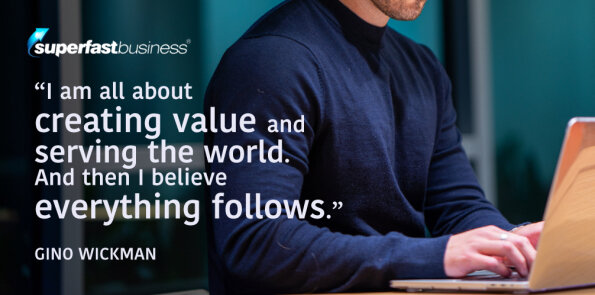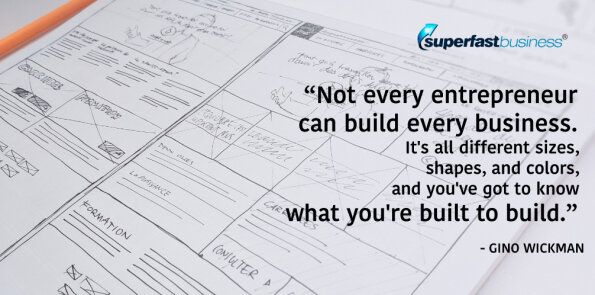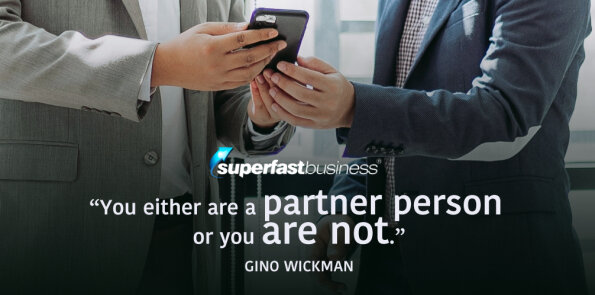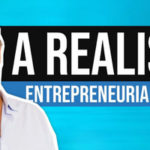Gino Wickman is a name known to many entrepreneurs. With books such as Traction, Rocket Fuel, and his newest title, Entrepreneurial Leap, he’s carved out a place for himself among the influencers of the business world.
An entrepreneur himself, Gino has made it his mission to help people looking to have and run their own businesses. In this interview, he shares some of the best insights from his book and his business journey.
Podcast: Download (Duration: 53:41 — 49.3MB)
Get Notified Of Future Episodes Apple Podcasts | Spotify | Amazon Music | Android | Blubrry | Gaana | TuneIn | Deezer | Anghami | RSS | More
Episode highlights:
James tells how his guest’s book helped change one corporate employee’s life. [02:02]
From barely graduating high school, to making his first million at 31, to now helping other entrepreneurs – This is Gino’s backstory. [05:41]
Entrepreneurs are born, says Gino – see if you’ve got what it takes to own and run a business. [09:05]
Do entrepreneurs benefit at all from a college degree? [13:54]
Some elaboration on the six entrepreneurial traits, and what you can do if you don’t have them… [17:46]
Everyone has their influencers. Gino talks about his. [23:12]
Is ego dictating your business goals? Our two experts discuss dream versus reality. [28:53]
If you could look behind the scenes of a billion-dollar business, you probably wouldn’t envy the CEO. [34:23]
Some people thrive in a partnership. Others are better off driving solo. [39:28]
To what extent should an integrator be involved in a visionary’s hiring process? [44:17]
If you could take away one thing from this conversation, Gino hopes it’s this. [49:29]
Need guidance in your entrepreneurial journey?
To a large part of the business community, Gino Wickman needs no introduction. The author of Traction and Rocket Fuel has helped and inspired many an entrepreneur in their journey.
In this guesting, however, he and James focus less on the material that made him a household name, and more on a passion project of his, represented by his 2019 title, Entrepreneurial Leap: Do You Have What It Takes to Become an Entrepreneur?
Before diving into that, James wants to thank Gino. His book, Rocket Fuel, was instrumental, with James’s help, in getting a friend off the corporate hamster wheel and into the life and freedom of an entrepreneur. Said friend is now fractional integrator to numerous clients in James’s circle.
That is a dream come true, says Gino. It takes him back 21 years to when he had a dream.
Quick backstory on Gino…
At a young age, Gino had wanted to be an entrepreneur. He’d also wanted to be a millionaire by 30, which he very nearly achieved. He discovered quite early on, though, that the entrepreneurial pathway is not smooth sailing.
“The entrepreneurial pathway is not smooth sailing. – James Schramko”
Brief history: Gino barely graduated high school with a a 2.3 GPA. He did not go to college – it was not for him, he says. He just wanted to work and make money. In his bumpy 20s he took over a family business and did a turnaround. He had great mentors, and a fanaticism for learning what makes businesses great.
He ultimately realized what he was meant for, and since that Aha has devoted his life to helping entrepreneurs. That lead him to create EOS, the Entrepreneurial Operating System now used by about 130,000 companies, and to write Traction, which has sold over a million copies.
And Gino did become a millionaire at 31, but lost it all and was $200,000 in debt by 33. So he’s seen and done it all. Now 54, he wants to devote his energies to helping entrepreneurs in the making.
“We teach what we needed the most. – Dan Kennedy”
Dan Kennedy said we teach what we needed the most. Gino is doing what he does for his scared, insecure 18-year-old self. He didn’t realize his latent entrepreneurial powers till 29, he says, which lost him 11 years of clarity.
 Four percent of the population, says Gino, their destiny is to become an entrepreneur. And some never realize that, and some stumble into it and discover it. His book, Entrepreneurial Leap, helps you know. And it will help you build your life, reduce your potential mistakes, and increase the odds of your success. It’s literally pre-entrepreneurship.
Four percent of the population, says Gino, their destiny is to become an entrepreneur. And some never realize that, and some stumble into it and discover it. His book, Entrepreneurial Leap, helps you know. And it will help you build your life, reduce your potential mistakes, and increase the odds of your success. It’s literally pre-entrepreneurship.
The six traits of a born entrepreneur
The book speaks of six traits entrepreneurs have, and what sets it apart, says James, is that it’s clear-cut: if you don’t have these qualities, you’re probably wasting your time. The good news, though, is there are other things you can do.
He’d like Gino to talk about these traits.
Gino obliges. He’ll do a high-level pass, he says, followed by a deeper dive. And he encourages listeners to assess themselves, as well as anyone else in their life who they think could be an entrepreneur.
The six essential traits that every true entrepreneur possesses are visionary, passionate, problem solver, driven, risk taker and responsible. That’s the high-level pass.
Now for the deeper dive:
1. Visionary means that you have lots of ideas. You can connect dots. You see things other people don’t. You see around corners and put things together. You’re an idea person, simply put.
2. Passionate means you have an undying passion for your product or your service, your thing. You want to fill a void in the world, to put a dent in the universe.
3. Problem solver means, when setbacks happen, you lean into them. You absolutely love solving problems. You’re an optimist by nature, and see solutions where most everyone else sees problems.
4. Driven means you have an internal fire, a sense of urgency. You are competitive, you want to succeed. You are self-motivated, you hustle, you love working hard.
5. Risk taker means you don’t freeze in the face of a tough decision. No analysis paralysis for you. You are rebellious by nature, and willing to fail. You don’t want to fail, but you’re willing. And you tend to beg for forgiveness rather than ask for permission.
6. Responsible means you blame no one. This often surprises people – how is responsible a trait for an entrepreneur? It is vital, says Gino.
Gino will debate to death that you are born with the above traits. You can’t learn them, he says, you’re born with them. He hopes he’s wrong, but believes he isn’t. How is it that of four kids with the same parents, same house, same upbringing, half take responsibility while the other two don’t? It can only be nature over nurture.
James wishes he’d had the book earlier, because there are people he couldn’t help with his mentoring, and he couldn’t put his finger on why. Gino’s book explains it.
Do you need college to be an entrepreneur?
Gino didn’t finish university. Neither did James. Does college have any bearing on one’s success as an entrepreneur?
Gino devotes a whole chapter to that topic. And after all his research and all the clients he’s handled and the entrepreneurs he’s spoken to, he concludes it’s a choice, one that does not define your success as an entrepreneur. Forty-six percent of business owners have a degree, meaning more than half don’t.
Gino has asked successful college-educated entrepreneurs if they applied anything from college in their business. And in every case, they say, no.
What’s interesting, though, is when he asks, knowing what they do now, would they go back to college? Most of them would, for two reasons. One, the relationships they had in college helped them later as entrepreneurs. Second, they were able in college to play, to create and sell stuff to their friends. It wasn’t about the education.
The traits again, two levels deeper
Gino wants to go further into the six traits. First, though, he refers listeners to a free assessment he’s made, 25 questions, which will score you for the six essential traits. Ninety or higher, you’re an entrepreneur in the making. Lower than that, you’re probably not. But at the end of the day, he says, you decide. He’s not good enough to tell you whether or not you are. The assessment is at e-leap.com.
But now he goes deeper into the traits, and this will probably remove some of the sting for those who don’t have them.
Picture an arc, he says. At the top, it says, entrepreneurial range. On the far right, picture the words, true entrepreneur. On the far left, see the word self-employed.
Now on the left side of the range are the sole proprietor, the freelancer, someone with a side hustle, making a few bucks on the side.
To the very right are the greatest entrepreneurs of all time – Elon Musk, Oprah Winfrey, Sara Blakely, Henry Ford, Walt Disney, Steve Jobs.
Every business owner is somewhere on that range. Gino is on there, but only about to the 75 percent mark.
And what he wants to talk about now is the people on the left side of the range – because while you may not have all of the traits, it doesn’t mean you can’t still own your own business and be self-employed.
The skilled handyman or handy woman, he says, can charge 60 bucks an hour, make 100 grand a year, and be self-employed and totally free. And if they’re any good, they’ll be busy for the rest of their lives. So there’s no shame in that.
But with the six essential traits, you will not be able to stop yourself from hiring someone for 25 bucks to finish a job, while you get another job, and then hire someone else, and so on till you have a construction company.
“Being an entrepreneur is not all it’s cracked up to be. – Gino Wickman”
And people without the traits may not be cut out for that, says Gino. Being an entrepreneur is not all it’s cracked up to be. It’s not for 96 percent of the world. You get hit with issues and problems all day. But as an entrepreneur you love it, you thrive on it.
James was going to say, speak for yourself.
Gino saw that, he says.
One of the mantras in the high-level group James runs is, Celebrate lack of drama. As a general manager, he got good at dealing with situations. And he knows some entrepreneurs are attracted to drama. But if you can stop the kid playing with matches in the first place, you save your house from burning down.
A different sort of business goal
Something about Gino that James resonated with was when he said he weren’t interested in being on the fastest-growing business list or the best places to work list. That’s how James and his team roll. He’s drawn a lot from people like Ricardo Semler, and they have a very organic business.
A lot of the people James coaches state as their first goal a $10 million a year revenue, presuming they’ve already made a million. Can Gino speak to that?
 James is right about him, says Gino. There are no ego decisions when he builds. He is all about creating value and serving the world. And then he believes everything follows.
James is right about him, says Gino. There are no ego decisions when he builds. He is all about creating value and serving the world. And then he believes everything follows.
He loves this quote from Good to Great by Jim Collins: The greatest company in America we will never know, because it’s some $10 million company in middle America that doesn’t want to be known.
That is what Gino wants to build. He doesn’t want or need to be known. He just wants to build an amazing company that’s second to none. And he doesn’t need anybody’s score as to whether it’s the greatest, other than his own.
When he read that quote, Gino decided to build that $10 million company, throwing off a 25 percent profit. He built it, and it threw off a 50 percent profit. That was the company he sold. But it drove him, he says, point one.
“Revenue is such a mirage. – Gino Wickman”
Point two, revenue is such a mirage. Clients come to him wanting to build a $100 million company. Ninety-nine percent of entrepreneurs are not built for that. And once they remove ego from the picture, they realize a $5 million heating and cooling company, throwing off a 25 percent profit, is actually a really great gig and tough to build. Many of those clients settle after some debate on $20 million.
Gino would rather have a $10 million company throwing off a 20 percent profit than a $100 million company throwing off a two percent profit.
If you were CEO of a billion-dollar company…
Gino says, if he could show you a day in the life of the CEO helming a billion-dollar company, you would say instantly that you didn’t want it.
Say you are an entrepreneur in the making. One of the things Gino does in his book is he shares a tool called MyBiz Match. And what it does is help you understand, as an entrepreneur in the making, what business you’re built to build.
 Not every entrepreneur can build every business. They’re all different sizes, shapes, and colors, and you’ve got to know what you’re built to build.
Not every entrepreneur can build every business. They’re all different sizes, shapes, and colors, and you’ve got to know what you’re built to build.
There are three main factors that go into business type: industry, type, and size. Gino’s tool takes you through each of them. First, the industry, of which there are hundreds to choose from.
Then there’s the type, three of them:
1. Product or service. Some people, like Gino, have utter disdain for products. Others are masterful and make a lot of money from them.
2. B2B or B2C. You either love selling business to business, or you’re great at selling to consumers.
3. High price, low volume, or low price, high volume commodity base. Rarely can you be both.
Finally you have the size of the business. Do you want to build a million-dollar company? Do you want to build a billion-dollar company? Something in between? You want 10 employees? Do you want a thousand employees?
Mybiz Match, will pop out the perfect business that you’re drawn to. And knowing that, you can then find education, mentors, insight, information on that kind of business.
To partner or not to partner?
One of the eight disciplines in Gino’s book is deciding if you’re a partner person. James has heard people argue either way.
 How it works, says Gino, is you either are a partner person or you are not. It starts there. There’s no right or wrong answer, you have to decide. And you need to know it about yourself.
How it works, says Gino, is you either are a partner person or you are not. It starts there. There’s no right or wrong answer, you have to decide. And you need to know it about yourself.
Gino is a partner person. He loves having partners. But he doesn’t give up controlling interest.
What’s important to know is, half his clients own 100 percent of their companies. Half don’t, they have partners and share equity, and both are ridiculously successful.
Now say you’re a partner person. There are two types. One is comfortable giving up equity, giving people skin in the game. But they never fully give up control, they always have 51 percent or more. That’s how Gino likes to do it.
Second is the partner who wants equal partnership. If there’s two of you, 50:50. Three of you, third, third and a third. Again, you have to decide which kind you are.
Both work, says Gino. He can give lots of examples. But if you know which one you are, you can save yourself the trouble of undoing a decade’s worth of partnership when money and value come into question.
What Gino would like you to take away
If someone’s gotten this far into the episode, they’re likely going to check out Gino’s book and website. There they’ll find out if they’re an entrepreneur, and if so, what kind. But what is Gino’s wish for everyone tuning in?
Well, Entrepreneurial Leap is all about helping anyone who thinks they’re an entrepreneur discover what they are and live the life they were born to live. The first step is to read his book and take the leap.
When you’ve taken the leap, Rocket Fuel is the book to decide when it’s time for you to go find your integrator. Thank you, James, for spreading that word to the world.
Read the Traction book to implement EOS in your business as you grow and start to have lots of employees. Then the EOS Life book will help you live your ideal life as an entrepreneur.
Then the aha walah moment, says Gino, is something he created called 10 Disciplines for Managing and Maximizing Your Energy, which is how to live your optimal life.
It all starts at e-leap.com, where you can get Entrepreneurial Leap. For everything else, check out ginowickman.com, and you’ll see the epicenter of everything Gino’s created.
But the real answer to James’s question is, Gino’s wish for everyone on the planet is to let their freak flag fly. He is there to help entrepreneurs and leaders maximize their freedom, creativity and impact on the world, and to do that with humility.
If we can all fully live from our souls and shed whatever screwed us up in life and just fully be us in all of our glory, Gino believes the world will be a better place.
Join the tribe of successful entrepreneurs inside JamesSchramko membership
Liked the show? Enjoy all the episodes when you subscribe on iTunes









Leave a Reply